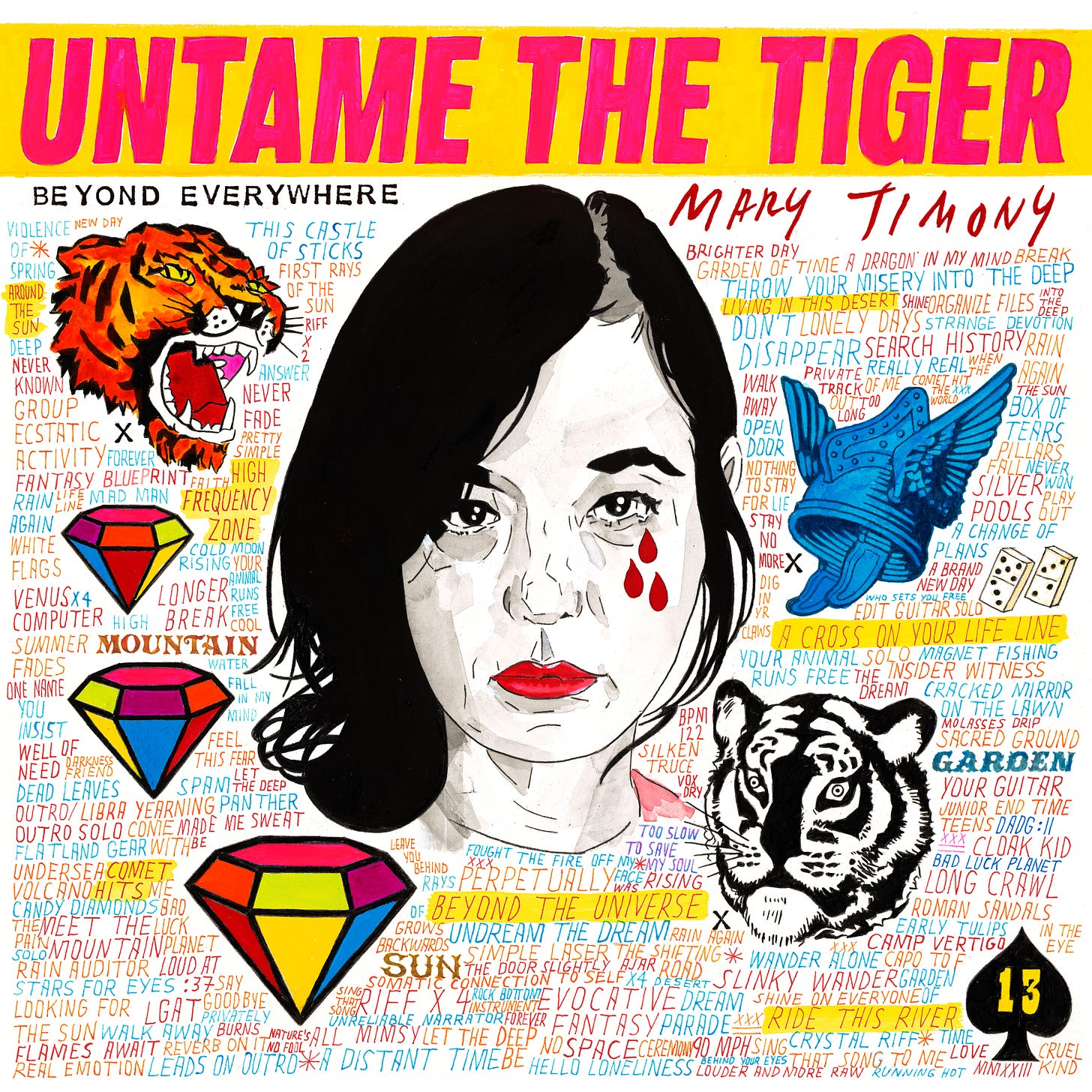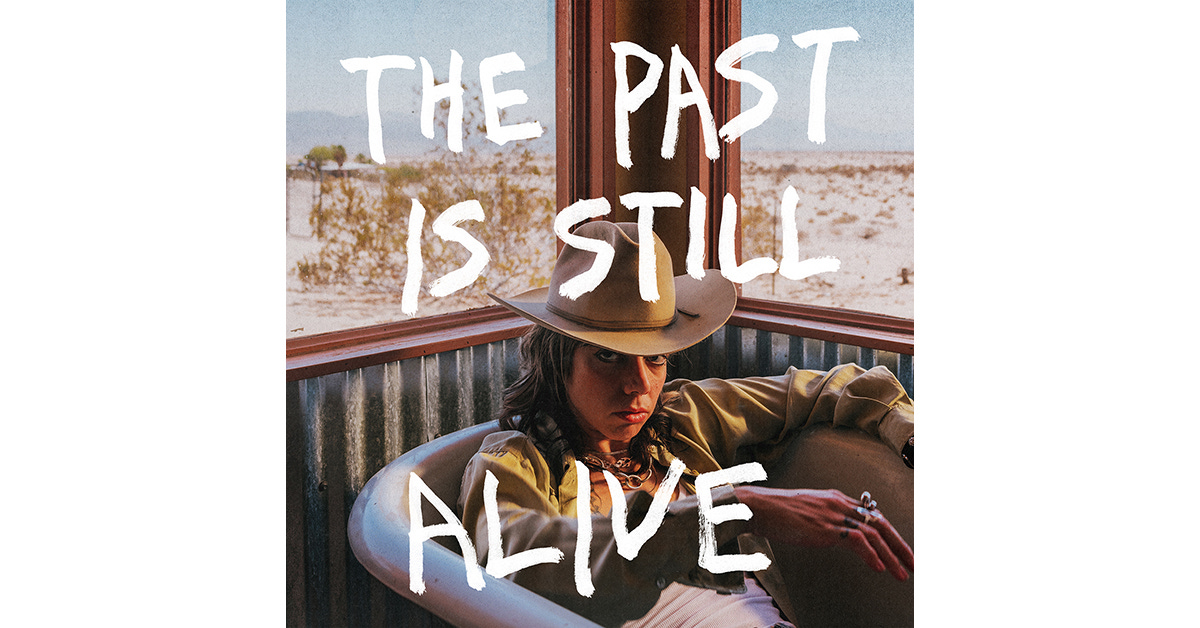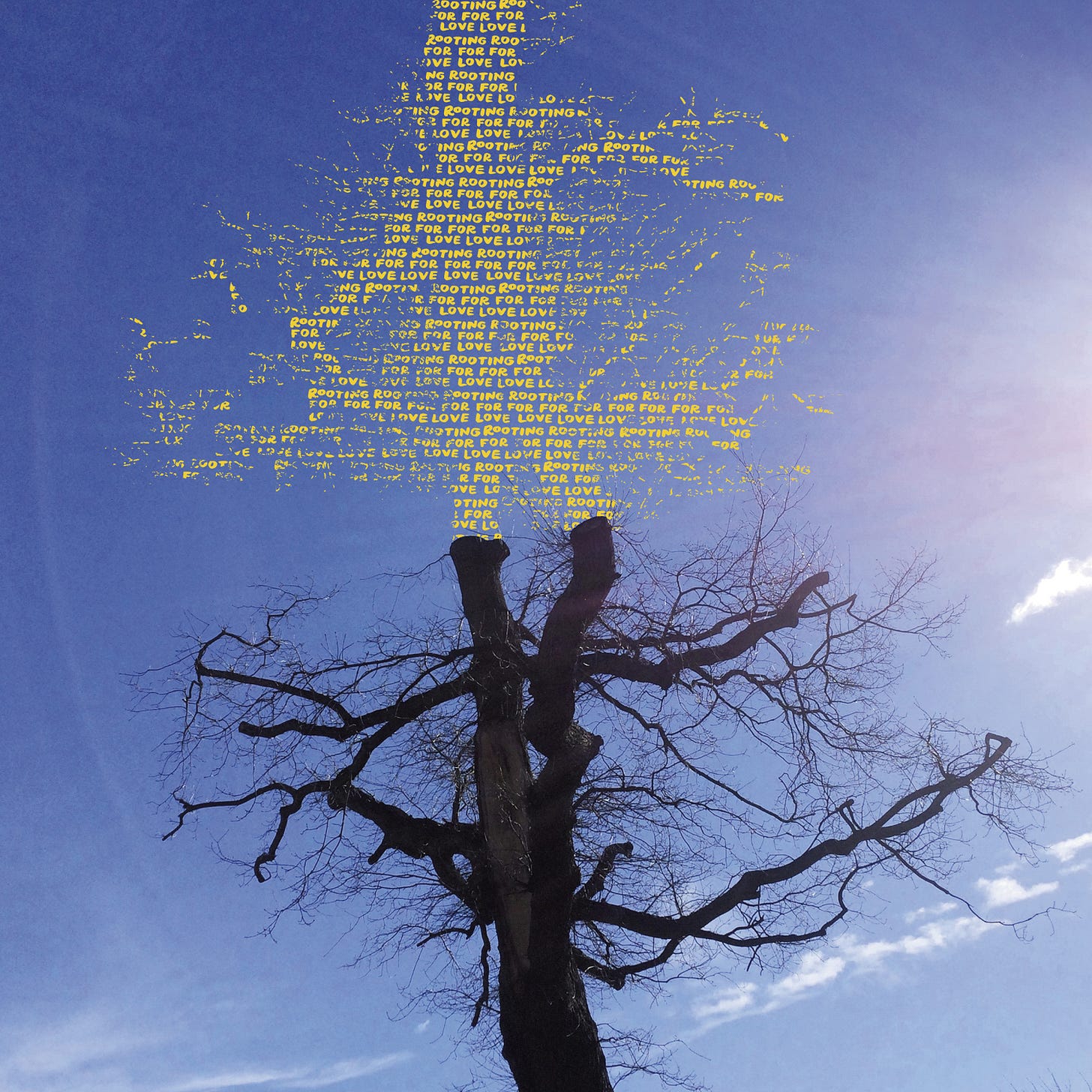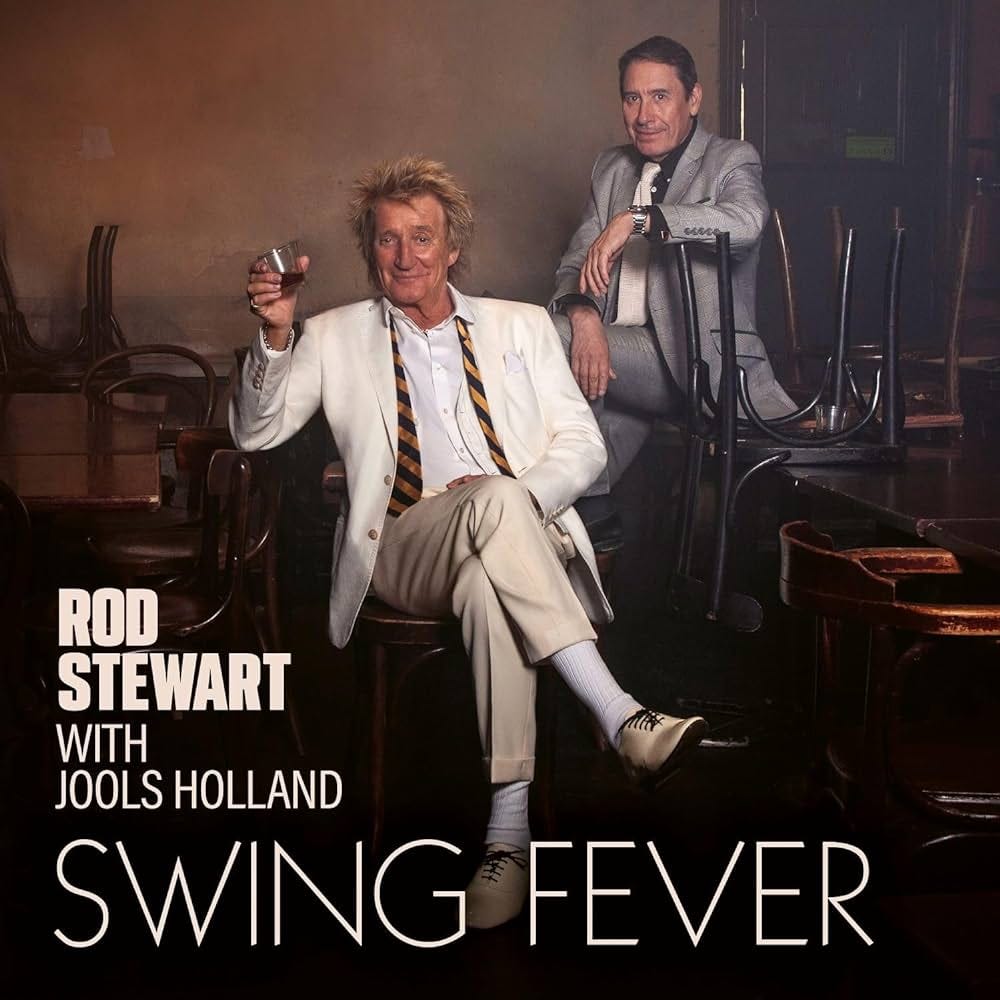Pumping on Your Stereo 2-26-24
Mary Timony and Hurray For The Riff Raff grieve, Stereolab's Laetitia Sadier resumes her solo career, Rod Stewart & Jools Holland swing, Glen Campbell Sings Jimmy Webb, Andy Williams sings disco
Mary Timony—Untame the Tiger (2024)
It's been nearly twenty years since Mary Timony, the singer/songwriter who built a cult following as the leader of '90s indie stalwarts Helium, released a solo album but she hardly was still in the interim. Untame the Tiger arrives after Timony's decade leading Ex Hex, a neo-AOR outfit that progressed further into the territory she explored with Wild Flag, the indie supergroup that also featured Carried Brownstein and Janet Weiss of Sleater-Kinney. Shifting into solo gear strips Timony of the added muscle of a band but not her precision. Any dreaminess on Untame the Tiger is deployed as an accent, adding texture and color to songs that are musically direct and emotionally forthright. Primarily written during a period of loss for Timony—she spent the better part of two years as a caregiver to her dying parents—Untame the Tiger doesn't flinch from grief, nor does it wallow in sadness. Timony spends the album working through her pain, gaining strength through articulating her mourning as well as the process of making music itself. Echoes of Ex Hex's classicism drift through the album—"The Guest" has a guitar riff that rhymes with the one that powers Grateful Dead's "St. Stephen," she invites Fairport Convention drummer to play on much of the record—but these flourishes are paired with the expansive canvass of her earliest solo efforts; there's sonic imagination here but it's sculpted with care. The blend of candid feeling and clean melodies is simultaneously bracing and comforting; it's a multi-dimensional record, capable of stirring up ghosts and of reassuring jagged nerves.
Hurray for the Riff Raff—The Past is Still Alive (2024)
A companion album of sorts to Untame the Tiger, The Past Is Still Alive finds Alynda Segarra—the singer/songwriter who performs under the name Hurray for the Riff Raff—mourning her father while also lamenting the dissolution of the world they knew. Their inner hippie wins out over their punk instincts: Segarra decides it is better to engage than retreat, a choice they convey through unusual warm and welcoming arrangements. Once preaching revolution, they’re now seeking communion, a shift that’s evident in an album that seeks to comfort listeners instead of provoking them. My Allmusic review.
Laetitia Sadier—Rooting for Love (2024)
Futurism is the lodestar in Laetitia Sadier's career—a notion rooted in the past even as it yearns to envision tomorrow. So what happens when the road ahead no longer looks as enticing as the distance behind? Rooting for Love, the first album Sadier has released since Stereolab reunited in 2019, answers that question to an extent. In an era when the promise of a new day has curdled, Sadier seeks sustenance through the musicality that's sustained through thirty years: unexpected stylistic juxtapositions, barbed sentiments cloaked in gentle harmonies, an insistent—but not overpowering—rhythmic thrum that grounds the music without shaping its direction. The title is unexpectedly sincere: Sadier is seeking connection, leading her to places of contemplation, culminating in a quiet concluding half that feels appealingly settled. There are new flourishes in the arrangements but the aesthetic remains the same, the familiarity offering solace in an unsettled time.
Rod Stewart & Jools Holland—Swing Fever (2024)
More than twenty years after Rod Stewart first engaged with the Great American Songbook, he's finally delivered an album of standards worth playing a second time. Swing Time finds the old smoothie hooking up with Jools Holland, the former Squeeze pianist who became a British music institution through hosting the BBC2 program Later..With Jools Holland. A boogie woogie believer since the days of pub rock, Holland turns out to be the ideal foil for Stewart: they share similar tastes and a spirited sense of humor, giving Swing Fever a genuine genial bounce. My Allmusic review.
Glen Campbell—I Am A Lineman for the County: Glen Campbell Sings Jimmy Webb (2024; 1967-1982)
Jimmy Webb played such a monumental role in Glen Campbell's creative life that it's easy to overlook that the singer never brought one of the songwriter's tunes toward the upper reaches of the charts after 1969. That year, "Galveston" closed out an unofficial trilogy of geographic pop begun by "By the Time I Get to Phoenix"--"Wichita Lineman" is the bridge that connects the two-- reaching number one on Billboard's Country and four on the Hot 100, a stat not matched by "Where's the Playground Susie," a florid melodrama that rightfully placed higher on the adult contemporary charts than either country or pop. Campbell would become an adult contemporary fixture in the 1970s, a period of time that provides the source for the great bulk of I Am A Lineman For The County: Glen Campbell Sings Jimmy Webb, a new compilation assembled by Bob Stanley for Ace Records. This shouldn't be seen as a hits collection by any means. After "Where's the Playground Susie," Webb songs stopped showing up as Campbell singles. The notable exception was "It's a Sin When You Love Somebody," a song pulled from Reunion: The Songs of Jimmy Webb—a 1974 album happening a mere four years after the singer last recorded the songwriter—which stalled at 16 on the country charts and barely made waves on AC radio. Campbell called Reunion "the best album I ever recorded" but "Capitol let that album fall through the cracks," assessments that aren't mutually exclusive. By the mid-1970s, Webb drifted away from easily digestible songs; literate and baroque, they required concentration even when delivered by a singer as smooth as Campbell. I Am A Lineman For The County illustrates how Campbell continued to treat Webb's songs with care and consideration into the early 1980s, delivering thoughtful interpretations as he gently changed his approach to mirror the times. By the time this concludes with "In Cars" and "I Was Too Busy Loving You," the strings were being edged out by synthesizers as the production steadily grew slightly antiseptic—an evolution the compilation sells elegantly.
Footnote: Back in 2006, I wrote the liner notes for Sings The Best of Jimmy Webb 1967-1992, a compilation for the late, lamented Australian reissue label Raven. There is a fair amount of overlap between these two compilations but I'd give the Ace collection the edge (and it's now much easier to find)
Andy Williams—When You Fall in Love: Lost Columbia Masters 1977-1982 (2024; 1977-1982)
The last time Andy Williams troubled Billboard was in 1976 when "Tell It Like It Is" wrapped up its run on the Adult Contemporary charts. It wasn't for lack of trying. Williams spent the next six years recording and recording for Columbia, attempting to chase trends that inevitably remained out of reach. Columbia released some of these tracks as singles—it helped if Williams covered a song from a hit sequel, as he did with "Sunshine Smiles" (aka the theme song from For The Love of Benji) or "The Music's Too Sweet Not to Dance" (aka the Love Theme from Oliver's Story [aka the sequel to Love Story])--but many were squirreled away in the vault until When You Fall In Love: Lost Columbia Masters 1977-1982. "Lost" should be interpreted as a matter of archeology: the compilers have excavated what amounts to a cultural history of the forgotten late 1970s. Resplendent in sumptuous strings and glittery guitars, its uptown country detours punctuated by the occasional disco thump, this is the sound of undiluted showbiz—mood music for star-studded variety shows and heart-warming sitcoms. Whether it's an ABBA or Everly Brothers cover, Williams gamely sings whatever comes his way, trading leisure suits for disco duds if the occasion calls for it. The period charms of the relentlessly chipper "You" and the seven-minute twelve-inch mix of "Love Story" wind up eclipsed by "Christine, She's a Woman Now," a mawkish masterpiece sung from the point of view of a widower addressing his dead wife on the day of their grown daughter's wedding. Tasteful it isn't.
Jennifer Lopez—This is Me…Now (2024)
A concept album exploring J. Lo rekindling her relationship with her ex-fiancee—and current husband—Ben Affleck should've been a tacky masterpiece of self-absorption but This Is Me…Now is too careful and, yes, too sincere to be anything other than a curiosity. My Allmusic review.
Cast—Love is the Call (2024)
Seemingly middle-aged when they were young men, Cast wears their maturation well. Nearly three decades after their debut All Change, Cast's indifference to evolution no longer seems belligerent; they're happy to be here, still able to mine and refine the sounds of the 1960s, sometimes in appealing ways, never in a fashion that alienates.
https://www.allmusic.com/album/love-is-the-call-mw0004166721
Blackberry Smoke—Be Right Here (2024)
A likable workaday band fulfills the requirements of their job. My Allmusic review.








